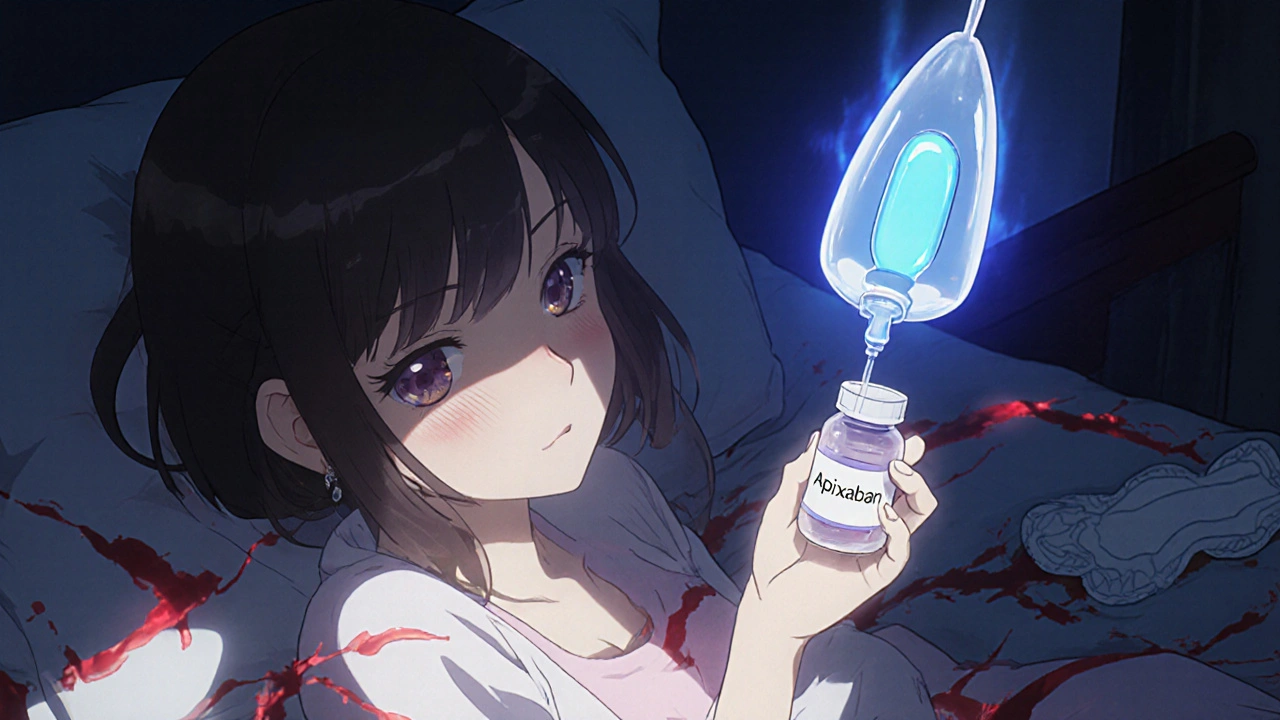Heavy Bleeding Treatment Estimator
Treatment Effectiveness Estimator
Get an estimate of how much your heavy menstrual bleeding might improve with different treatment options while on blood thinners. Based on clinical studies and expert guidelines.
Your Current Situation
Treatment Options
Estimated Results
Important Considerations
This tool provides an estimate based on clinical studies and general guidelines. Individual results may vary.
Never stop or skip your blood thinner without consulting your doctor. Stopping increases your risk of life-threatening clots by up to 5 times.
Your doctor will consider your specific medical history before recommending treatment.
When you start taking a blood thinner-whether it’s for a blood clot, atrial fibrillation, or another condition-you’re told it could save your life. But no one mentions it might make your period unbearable. For many women, heavy menstrual bleeding (HMB) isn’t just a nuisance-it’s a life-disrupting side effect that’s often ignored by doctors. If you’re on a blood thinner and your periods have turned into a daily battle with leaks, cramps, and exhaustion, you’re not alone. And more importantly, there are real, effective ways to fix it-without stopping your medication.
Why Blood Thinners Make Periods So Heavy
Blood thinners, also called anticoagulants, work by slowing down your body’s ability to form clots. That’s great for preventing strokes or pulmonary embolisms. But when it comes to your uterus, that same mechanism means your menstrual blood doesn’t clot properly. The result? Longer, heavier flows that can soak through pads or tampons every hour. Some women report needing to change products every 30 minutes, waking up soaked at night, or having to carry emergency changes everywhere they go. Research shows this isn’t rare. About 70% of menstruating women on oral blood thinners experience heavy bleeding serious enough to need medical help. That’s way higher than the 10-30% you’d see in women not on anticoagulants. And it’s not just about volume-many women develop iron deficiency anemia from the constant blood loss. Fatigue, dizziness, and shortness of breath become part of daily life. What’s worse? Most doctors don’t ask. A 2023 survey found that 68% of women said their hematologist never brought up menstrual changes after starting anticoagulation. Even though the American Society of Hematology and ACOG now recommend discussing this risk at the start of treatment, it’s still not standard practice.Which Blood Thinners Are Less Likely to Cause Heavy Periods?
Not all blood thinners are the same when it comes to menstrual bleeding. If you’re on one and your periods have gotten worse, switching might help. Studies show that apixaban and dabigatran are linked to lower rates of heavy menstrual bleeding compared to rivaroxaban. Warfarin, the older blood thinner, also carries a high risk. While exact numbers vary, the pattern is clear: some drugs are simply gentler on your cycle. If you’re on rivaroxaban or warfarin and struggling with HMB, talk to your doctor about switching. You don’t have to accept heavy bleeding as inevitable. Many women report noticeable improvement within a few months after switching to apixaban or dabigatran-without losing protection against clots.First-Line Treatments: Hormonal Options That Work
The best news? You can treat heavy bleeding without stopping your blood thinner. In fact, skipping doses or quitting anticoagulation increases your risk of another clot by up to five times. That’s why doctors now focus on managing the bleeding, not stopping the medicine. The most effective first-line treatment is hormonal therapy-specifically, progesterone-based options:- Levonorgestrel IUD (Mirena, Kyleena): This small device releases progesterone directly into the uterus. Within 3-6 months, 70-90% of women see a 70-90% drop in menstrual blood loss. Some stop having periods altogether. One woman on Eliquis shared on Reddit: “After getting Mirena, my periods went from ER visits to nearly nonexistent.”
- Progesterone implant (Nexplanon): A tiny rod placed under the skin of your arm. It works similarly to the IUD but without the intrauterine placement. Many women report lighter periods or no periods at all.
- Oral progestins: High-dose norethisterone (5 mg three times a day for 21 days) is recommended by the American Society of Hematology for acute bleeding. It can be taken monthly during your period to reduce flow.
Tranexamic Acid: A Non-Hormonal Option
If you don’t want hormones-or can’t use them-tranexamic acid is a solid alternative. It’s a prescription pill that helps your blood clot normally during your period. You take it only during bleeding days, usually for 4-5 days per cycle. Clinical trials show tranexamic acid reduces menstrual blood loss by 30-50%. It’s not as effective as the IUD, but it’s a good middle ground. It doesn’t affect your hormone levels or fertility. You can stop and start it as needed. The catch? Timing matters. You need to start taking it as soon as bleeding begins. And because it works by promoting clotting, your doctor will check your risk for other clots before prescribing it-especially if you’ve had a recent clot or are on a high-dose anticoagulant.What About NSAIDs Like Ibuprofen?
You might think over-the-counter painkillers like ibuprofen or naproxen can help. And they can-sometimes. NSAIDs reduce menstrual bleeding by 20-40% in some women by lowering prostaglandins, which cause uterine contractions and heavy flow. But here’s the problem: NSAIDs also thin the blood. Taking them with anticoagulants increases your bleeding risk. It’s not a simple add-on. If you want to try ibuprofen, talk to your doctor first. They might suggest a lower dose or only use it on heavy days, not every day. Never combine aspirin with blood thinners unless your doctor says it’s safe.When Surgery Is Considered-and When It’s Not
Endometrial ablation is a procedure that destroys the lining of the uterus to reduce or stop periods. It works for 80-90% of women not on blood thinners. But for women on anticoagulants? It’s risky. The procedure itself can cause serious bleeding. Even with careful planning, you’d need to temporarily stop your blood thinner and switch to heparin injections-a process that increases clot risk. Plus, you still need reliable birth control afterward, because pregnancy after ablation is dangerous. Because of these risks, ablation is only considered a last resort. Most doctors won’t recommend it unless hormonal options and tranexamic acid have failed-and even then, only if you’re sure you don’t want children in the future.
Iron Deficiency Is Common-And Treatable
If you’ve been bleeding heavily for months, you’re probably low on iron-even if your hemoglobin hasn’t dropped into anemia territory yet. Symptoms include fatigue, brain fog, cold hands, brittle nails, and heart palpitations. The National Blood Clot Alliance recommends all women on anticoagulants with heavy periods get tested for iron deficiency. A simple blood test (ferritin level) can tell you if you need supplements. Oral iron tablets are usually enough. But if your levels are very low, your doctor might recommend IV iron. It works faster and causes fewer stomach issues than pills. Don’t ignore this. Iron deficiency isn’t just uncomfortable-it can make you feel like you’re always sick, even if your clot risk is under control.What to Say to Your Doctor
If your doctor hasn’t asked about your periods, it’s time to speak up. Here’s what to say:- “Since starting [name of blood thinner], my periods have become much heavier. I’m changing pads every hour.”
- “I’ve been feeling exhausted and dizzy. Could I be low on iron?”
- “I’ve heard that the Mirena IUD helps with heavy bleeding on blood thinners. Is that something I could try?”
- “Can we talk about switching to apixaban or dabigatran if my bleeding doesn’t improve?”
The Bigger Picture: Why This Matters
Heavy bleeding isn’t a “minor” side effect. The term “patient-relevant bleeding” is now used instead because it captures what really matters: your life. Women report missing 3-5 workdays a month. They avoid social events, gym classes, travel. They live in fear of leaks. And when bleeding gets too bad, some women stop their blood thinners. That’s dangerous. One study found 30-50% of young women discontinue anticoagulation within the first year because of menstrual bleeding. That’s a huge number-and it’s preventable. New guidelines are coming in 2025 from ACOG and the American Society of Hematology. But right now, you don’t have to wait. You have options. You deserve to feel safe-not just from clots, but from your own body.Can I still get pregnant if I use a hormonal IUD while on blood thinners?
Yes, you can still get pregnant if the IUD fails or is expelled, but the levonorgestrel IUD is over 99% effective at preventing pregnancy. It doesn’t interfere with your blood thinner, and you can safely use both together. However, if you plan to get pregnant in the next year, talk to your doctor. Some hormonal options, like the implant or oral progestins, are easier to stop if you’re trying to conceive.
Will tranexamic acid interact with my blood thinner?
Tranexamic acid works by helping your blood clot, so there’s a theoretical risk of increasing clotting when combined with anticoagulants. But in practice, studies show it’s safe when used only during your period and under medical supervision. Your doctor will check your overall clot risk before prescribing it. Never take it daily-only on bleeding days.
How long does it take for the Mirena IUD to work?
Most women notice lighter bleeding within 3 months. By 6 months, many report a 70-90% reduction in flow. Some stop having periods altogether. It’s normal to have spotting or irregular bleeding in the first few months. That usually settles down. If bleeding gets worse or you have severe pain, contact your doctor.
Can I take iron supplements with my blood thinner?
Yes, iron supplements don’t interfere with anticoagulants. But they can cause stomach upset, constipation, or dark stools. Take them with vitamin C (like orange juice) to improve absorption. Avoid taking them with calcium or antacids. If oral iron doesn’t help, IV iron is a faster, more effective option your doctor can arrange.
Should I stop my blood thinner if my periods get too heavy?
Never stop or skip doses without talking to your doctor. Stopping your blood thinner increases your risk of a life-threatening clot by up to five times. Instead, focus on treatments that reduce bleeding while keeping you protected-like the IUD, tranexamic acid, or switching to a different anticoagulant. Your doctor can help you find a solution that keeps you safe from both clots and excessive bleeding.

Melvina Zelee
November 23, 2025 AT 22:20